
28 minute read
RGR Newsletter
from 6 GR Journal 100
ROYAL GURKHA RIFLES NEWSLETTER FIRST BATTALION
This year began as the last year ended, with the bulk of 1 RGR deployed in Kabul on Op TORAL 7 from October 2018 to May 2019. Op TORAL is the UK contribution to the NATO RESOLUTE SUPPORT mission which focuses on the institutional development of key Afghan Government Ministries and is delivered primarily through its Train, Advise, Assist (TAA) line of operation.
The responsibility for enabling and protecting those who delivered the TAA in Kabul rests exclusively with the Kabul Security Force (KSF) and their single Battle Group, the Kabul Protection Unit (KPU). For six months elements of 1st Battalion The Royal Gurkha Rifles, 3rd Battalion The Parachute Regiment and 1st Battalion The Royal Anglian Regiment came together under a single 1 RGR Battle Group Headquarters to be the KPU for Op TORAL 7. The 1 RGR contribution saw just under 300 soldiers deploy from October 2018 until the last man recovered in early May 2019. Throughout B (Sari Bair) Company and Battalion HQ were based in the very centre of the Kabul, from where they protected NATO advisors as they conducted missions at locations all across the city. B (Sari Bair) Company also provided a quick-reaction force for incident response. C (Mogaung) Company was based at the Hamid Karzai International Airport in the North of the city and protected NATO advisors at the Afghan New Ministry of Interior Affairs, the Headquarters of the Afghan Air Force and the RAF’s aviation detachment.
The more significant High-Profile Attacks (HPAs) that the insurgents conducted on Op TORAL 7 happened in 2018, including the action at the G4S base known as Camp ANJUMAN. However, the KPU QRF were still stood to on over a dozen other occasions during the
second half of the tour in 2019. During Op TORAL 7 1
HRH The Prince of Wales presenting 1 RGR soldiers with their Op TORAL medals at the RGR 25 celebrations in Sir John Moore Barracks, Shorncliffe, 9 July 2019
RGR operated at over 100 sites across the city, giving ample opportunity for the soldiers to get out and about all over Kabul. By Spring 2019, as the tour came to a close, over 10,000 patrols had been conducted.
Exercise SWIFT RESPONSE, June 2019
Unlike the other companies, A (Delhi) Company did not deploy on Op TORAL and were instead attached to 3 PARA on readiness. This included a large number of exercises, culminating in Exercise SWIFT RESPONSE as part of 3 PARA BG in Croatia, US EUCOM’s largest training event of the year.
On arrival in Croatia the Company conducted build-up training whilst they acclimatized to the notable heat of the Croatian summer. This included night training, building clearances and company-level advance to contacts. On conclusion of this, the Exercise began, during which A (Delhi) Company helped the 3 PARA BG secure Ubdina airfield. This was followed by securing a notional train station that represented an important logistical hub. The final mission was a BG clearance across a mountainous region near the border with Bosnia. The exercise concluded with a couple of days R&R at the stunning Plitvice Lakes National Parks before the Company travelled back to the UK.
Becoming the Air Manoeuvre Battle Group and RGR 25, June – August 2019
As the bulk of the Battalion extracted back to the UK from Kabul, Battalion HQ’s eyes were already focusing on the next challenge. While the Battalion had been deployed, the Battalion 2IC and OC Support had been preparing for 1 RGR to take over the role of Air Manoeuvre Battle Group (AMBG) from 3 PARA. The AMBG is the lead Unit in 16 Air Assault Brigade and is held at very high readiness. It is a task that the RGR Battalion in 16 Air Assault Brigade had never been given the opportunity to do previously.
On return from post tour leave the Battalion took over the new role, re-zeroing weapons, conducting Air Manoeuvre briefing days (including visits to Brize Norton) and a lot of Public Order training. The final hurdle for the Battalion was to have their readiness
A Section Commander gives arcs while establishing all-round defence on the position
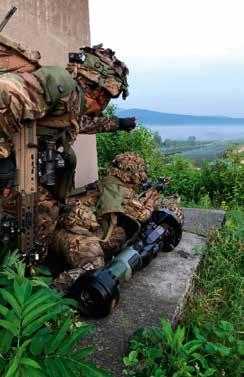
SOPs tested by Brigade on Exercise TOTEMIC. All of this was done concurrently to the preparations for the Op TORAL 7 medals parade, which was combined with the Battalion’s RGR 25 Birthday celebrations, and was delivered in the same week as HQ Brigade of Gurkha’s Brigade Week!
Despite the hectic schedule, the RGR 25 Parade on 9 July was a day to remember for those who were there. Attended by HRH The Prince of Wales, alongside many other VIPs and dignitaries, it saw medals awarded to a large swath of the Battalion. 1st Parachute Chasseur Regiment, our partnered French Airborne unit, also sent representatives. The Assault Pioneers unveiled the newly constructed Battalion chautara outside the Corporals’ Mess, built with the assistance of the Queen’s Gurkha Engineers. The Prince of Wales’ Kukri, Tuker Award and Slim Award
Soldiers from A (Delhi) Company celebrate winning the Champion Company competition Each company put forward a patrol to navigate a winner of the event.
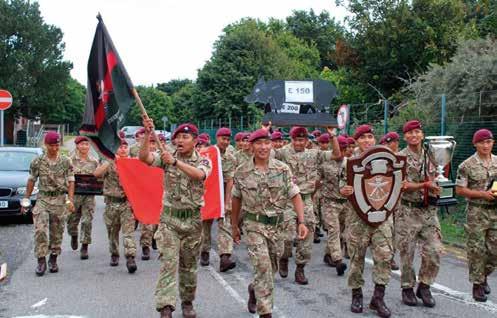
were also presented, and everyone had a fantastic day celebrating 25 superb years of dedicated service to the crown.
Champion Company Competition
Due to limited time, this year’s Champion Company competition was composed of just The Afghan Trophy (fitness), The Bullock Trophy (military skills) and The Wallace Memorial Trophy (sports).
B (Sari Bair) Company took an early lead in the competition by winning the Afghan Trophy. The first element of the competition involved completing a number of repetitions of different gruelling exercises on the MT square in combats and body armour. This was following by competitors running up and down hills around the back area of camp, before a number of other ‘battle-PT’ style exercises were completed on and fire and manoeuvre.
The Bullock Trophy focused on testing a broad range of military skills in the form of a patrols competition. The competition is named after Brigadier Christopher Bullock MC, who led numerous ‘Claret Operations’ during the Borneo Confrontation during the 1960s. route around Cinque Port Training Area where they completed a variety of tasks at different stands. These tasks included military knowledge tests, air assault vehicle recognition and more practical command tasks. A (Delhi) Company were announced as the
the sports pitches, including casualty drags, crawling
The Wallace Memorial Trophy included a broad set of sporting events and culminated with the majority of Battalion personnel completing a seven-mile crosscountry race across challenging terrain on St Martin’s Plain. The Wallace Memorial Trophy was also won by A (Delhi) Company, who retained their place as Champion Company for a second year.
Exercise OLIVE GROVE, August – September 2019
As the rest of Battalion began to disappear on summer leave, C (Mogaung) Coy and the newly
The training opportunities in Jordan were phenomenal
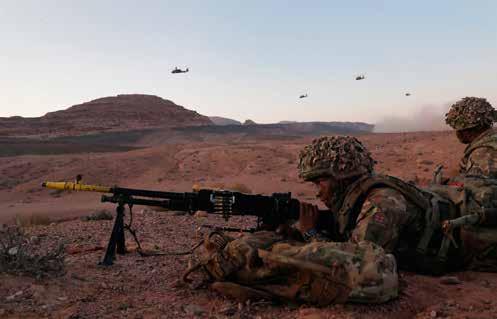
formed Machine Gun Platoon from Support (Medicina) Company began their deployment on Exercise OLIVE GROVE in Jordan. Throughout the exercise, they were partnered with 2nd Company of the 61st Battalion of the Jordanian Quick Reaction Force (QRF) Brigade. This was in line with the strategic partnership that 16 Air Assault Brigade has with QRF, which sees each of the three Battalions in the Brigade assigned a partner Battalion in the QRF.

The exercise was for six weeks and included an acclimatisation week, a three-week Live Fire Tactical Training (LFTT) phase, a week-long blank Final Training Exercise (FTX) and finally a short R&R, Adventure Training and cultural package.
Support (Medicina) Company and Assault Pioneer Platoon Cadres, September 2019
Over the summer, Support (Medicina) Company welcomed 34 new soldiers into the Company. The
large uptake in personnel in each specialised Platoon meant that an all-encompassing cadre was essential to keep the Company battle ready. The Company therefore set out to train all new joiners in their role as mortarmen, machine gunners, snipers, Javelin operators, Recce patrolmen and Assault Pioneers, as well as refresh those already in the specialist Platoons. Much of the training was conducted on the Salisbury Plain training area. An unexpected highlight of the Cadre was the opportunity to take part in Prime Minister Boris Johnson’s visit to Salisbury Plain Training Area. Members from the Anti-Tank Platoon gave a brief about RWIMIK vehicle capabilities to the Prime Minister, who seemed very impressed, although he was less effusive about the 24hr rations he was given!
The Machine Gun Platoon found themselves in the envious position of being able to conduct their cadre in the deserts of Jordan, attached to C (Mogaung) Company on Ex OLIVE GROVE. The cadre focused training on the General-Purpose Machine Gun Sustained Fire (GPMG SF) role.
Op ELGIN, September – October 2019
At the same time as Support (Medicina) Company were in the final stages of their cadres on Salisbury plain, A (Delhi) Company deployed to Camp Butmir in Sarajevo, Bosnia and Herzegovina (BiH), on Op ELGIN. A (Delhi) Company’s key activity was to take part in Ex QUICK RESPONSE as part of the Multinational Battalion (MNBN), simulating the EU Forces’ (EUFOR) reaction to hostilities erupting in BiH. The MNBN was made up of British, Austrian, Turkish and Hungarian companies and was commanded by an Austrian and Hungarian headquarters. A (Delhi) Company came to understand that the occasional Nepali-English confusion was nothing compared to the difficulties in communicating between four different nationalities.
Each company was dispatched to a separate corner of BiH to operate independently from the MNBN headquarters. A (Delhi) Company occupied a camp near Capljina, 100 miles south of Sarajevo near the border with Croatia. The company made the road move south through beautiful countryside in their antique Snatch Land Rovers, minus 1 Platoon who enjoyed the luxury of a much faster journey in Austrian Army helicopters in order to secure the Company’s HQ. The company was tasked with public order, evacuation and securing of vulnerable points. This involved extensive road moves, operating among and alongside civilians, and platoons working independently from Company HQ.
The exercise gave junior commanders complete autonomy when working at reach from CHQ and
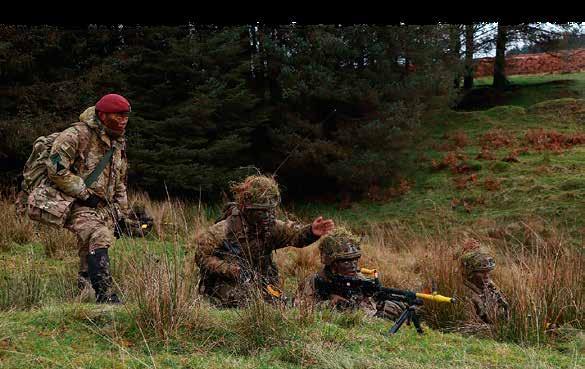
‘Clear, loud, as an order and with pauses’: A section commander brings his gunner onto the target
enabled them to develop their skills in peace support and civilian liaison.
JLC Intake 2016, November – December 2019
With all Companies of 1 RGR finally back in camp for a short while it was the ideal time for intake 2016 to complete their Junior Leadership Cadre (JLC) to qualify for promotion to Lance Corporal under B (Sari Bair) Company’s watchful eye. This year’s JLC was conducted in three phases at Sennybridge, the Brecon Beacons and Caerwent training area.
Exercise GAULISH, December 2019
The last Battalion event of the year saw Platoons from each of 1 RGR’s Rifle Companies come together under on Exercise GAULISH. This was an urban operations exercise in the ‘Centre d’entrainement aux actions en zone urbaine’ (CENZUB) training area in northern France. Along with attachments from the Royal Horse Artillery, the Royal Engineers and the Royal Military Police, the Company were bolstered by elements from both Support (Medicina) Company and HQ (Burma) Company. The exercise marked a culmination of many months of preparatory training focused on fighting in complex built up areas.
One of the objectives of the exercise was to demonstrate interoperability between ourselves and our French counterparts. A key element involved familiarising Gurkhas with the FAMAS assault rifle and the AT-4 CS anti-tank weapon, which they used throughout the exercise. Included as part of the familiarisation week was a package to understand and practice French tactics, techniques and procedures (TTPs). Whilst many of the TTPs were almost identical to those employed by the British Army, there were the command of A (Delhi) Company HQ and deploy
some slight variations on occasions and both parties benefited from understanding these differences.
The exercise phase saw the 1 RGR Company deploy to conduct a series of offensive and defensive actions across several purpose-built urban facilities. These included a train station, high-rise buildings, an underground car park, industrial zones and many other urban features that offered a unique and challenging environment.
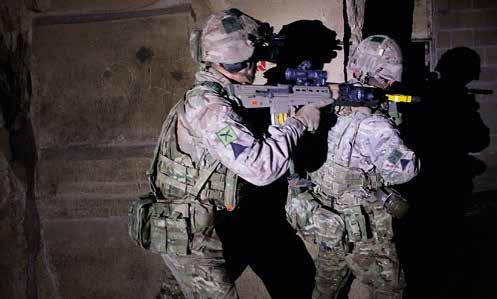
Honing the skills and drills required for night-time room clearance
CO 1 RGR, Lt Colonel Chris Conroy, is presented the Cambrian Patrol gold medal and a congratulatory letter from CGS notable achievements. The Nepal Cup and Volleyball
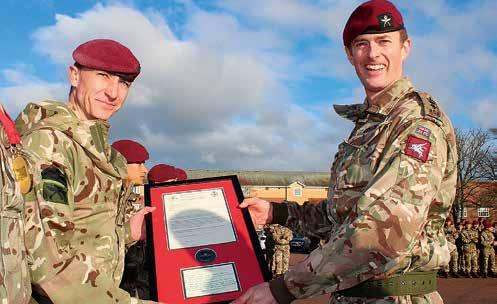
A combination of well-integrated attached personnel, comprehensive pre-deployment training and, in the words of the French directing staff, an “impressive aggressive fighting spirit”, resulted in a very strong performance. According to the staff, the Company achieved the second highest score by a British Army Company since the CENZUB training area was made available to British Forces in November 2010. It was a great way to finish the year.
2019 Achievements
It has been a whirlwind year of individual and small team achievements for 1 RGR. The Battalion were delighted to watch HRH The Prince of Wales present Lieutenant James Hornby with the Tuker Prize and Colour Sergeant Mukunda Rajali with the Prince of Wales Kukri during the RGR 25 celebrations for their exceptional work in 2018/19. The year also saw trips to Buckingham Palace for Major Pete Houlton-Hart, Captain Scott Sears and Corporal Netra Rana to be awarded MBEs for Operations, Antarctic expeditions The Shooting team and Cambrian Patrol team both had a hugely successful 2019. The Battalion shooting team took the top slot at Bisley and fielded a sniper pair that took first position at both the Army and Tri-Service Sniper competitions. The Battalion Cambrian Patrol team again supported the Nepalese Army team’s preparations before winning a gold medal for an astounding fourth year in a row. On the sporting field the Battalion also had a year of
and Paralympic Volleyball respectively. teams were both narrowly defeated in the finals, finishing second.
It has been a varied, challenging and thoroughly rewarding 25th anniversary year for the Battalion.
Jai 1 RGR!
(This is a shortened version of the 1 RGR report, which was 18 pages long and which described an extremely busy year for the Battalion. Editor)
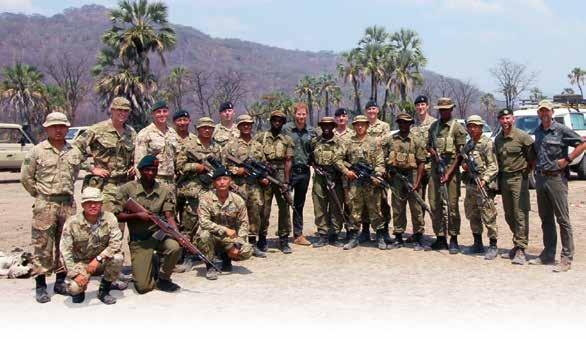
OP CORDED team with HRH Prince Harry in Malawi
SECOND BATTALION
Last year, 2019, had been another busy year for 2 RGR. We deployed C Company to Australia on Exercise PACIFIC KUKRI, run Battalion Headquarters Training with the CAST North team, run Junior Leadership Cadre (JLC) for Intake 16 and deployed the BFB Battlegroup to the jungle. Support Company soldiers have conducted counter poaching in Malawi for four months, and A Company has trained alongside the Royal Thai Army in Thailand. In addition to this we have continued to uphold the excellent reputation of the RGR in Brunei, supporting the Royal Brunei Armed Forces, and across the Army with success on career courses and events throughout the year.
B (Gallipoli) Coy JLC, January – March 2019
2 RGR had a rapid start to the year, launching straight into the Junior Leadership Cadre for Intake 16 soldiers. The cadre was run by Major Rob Morford and B (Gallipoli) Company out of Penanjong Camp, and consisted of the usual mix of conceptual and physical assessments, with the exercise elements of the course moving between the jungle and the of junior leaders the challenge of operating in the urban environment, which they have not done since joining the battalion two years ago. The cadre was a huge success, qualifying all students to promote to Lance Corporal and improving the leadership skills and experience of all involved. Top student was awarded to Rifleman Jyotishwar of A Company, who was promoted to Lance Corporal on conclusion of the Cadre.
2 RGR CAST, February 2019
In February 2 RGR HQ continued its training cycle with the help of the Command and Staff Trainer (CAST) North team. The team flew from Catterick out to Brunei to deliver valuable training for BHQ and continue a training cycle begun at the end of 2018. In the spirit of creating “tactical frictions” BHQ eschewed the idea of an indoor Ops room and urban environments. This gave our next generation
deployed its tents to Medecina Lines, truly replicating the heat and stress of operating a mobile HQ in Brunei. Despite a recent churn of BHQ personnel the exercise was a great success; with the HQ running smoothly, two full planning cycles were conducted and executed, the report from CAST North came back positive but with plenty of recommendations for its next run out later in the year.
Ex PACIFIC KUKRI PK 19, April – May 2019
Between April and May, C (Tamandu Company) deployed to Shoalwater Bay Training Area in
Queensland, Australia, for 2 RGR’s annual overseas training exercise, Ex PACIFIC KUKRI. This gave C Company, under the command of Major Andy Blackmore, a fantastic opportunity to conduct both blank and live firing up to Company level, with support elements of recce, snipers, anti–tanks and mortars embedded throughout. Shoalwater Bay’s subtropical climate and varied terrain gave everyone an opportunity to experience something different from the Brunei jungle, and for many was the first time operating in conjunction with support weapons. As well as the tactical elements of the training, it was a great opportunity to test the Company’s ability to deploy overseas and continued the RGR’s longstanding engagement with the Australian Defence Force.
During the Exercise, C Company were given the honour of taking part in Rockhampton city’s ANZAC day celebrations, forming part of an 800 strong parade which was watched by 5000 people from the city.
The exercise phase concluded with a dawn attack onto Freshwater Camp in Company strength. The men, exhilarated but exhausted from almost five weeks of operating, then returned to camp and turned their focus to adventurous training. Advanced planning meant in January 40 C Company soldiers were qualified as PADI Open Water divers and were able to enjoy a three-day diving package on Heron Island, which forms part of the Great Barrier Reef. Exercise PACIFIC KUKRI was a triumph for 2 RGR and for C Company, a huge training opportunity that was capitalised on by all participants. B Company looks forward to their deployment in 2020 to New Zealand, in the exercise’s next iteration.
Support (Imphal) Company Cadre, April – May 2019
2 RGR’s annual support weapons cadre was run shortly after Easter leave. The whole of Support Coy deployed to Sittang Camp to enable the recce, sniper, machine gun, anti-tank and mortar platoons to train and select new soldiers from the Rifle Companies. The end result is the Battalion is positioned to offer its full suite of capability to any future deployments.
OC Support Company placing a radio transmitter in the ear of a black rhino prior to release

Ex MESSINES RIDGE, May 2019
Shortly after the conclusion of Ex PACIFIC KUKRI it was now BHQ’s turn to deploy to Australia, this time in Brisbane as part of Exercise MESSINES RIDGE. 2 RGR HQ was subordinated to an Australian Brigade HQ for the exercise with elements playing Lo-Con too, all this part of a much larger Australian Defence Force exercise. BHQ personnel had a great opportunity to see a large joint headquarters in action, and to feel the realities of operating as a small cog in a joint and multinational environment, with its longer planning timelines and fewer freedoms. In contrast to CAST in February the exercise was run at a slower pace, giving plenty of opportunity for BHQ personnel to enjoy Brisbane during down time.
Ex TYPHOON KUKRI, June 2019
As part of a wider drive for 2 RGR to prove its deployability into the jungle, Ex TYPHOON KUKRI was run in June. The Ex aim was to test 2 RGR’s ability to conduct a battlegroup sized deployment into the jungle and sustain the whole battlegroup once installed. This was a great opportunity for the Battalion, as while we are all confident fighting in the
jungle, it has been years since the combat service support elements of the battlegroup have been tested in this way. With great support from across British Forces Brunei, especially from 7 Flight, 2 RGR was deployed at reach into Ulu Tutong. Now the challenge of sustaining the battlegroup began. The CSS team did a great job, combining road, aviation and boat moves to keep all soldiers stocked with front line scales throughout the exercise. The Exercise acted as a warm-up for Ex HIKMAT BERSATU, which again would see the Battlegroup deploying into the Ulu Tutong, but this time with a free play enemy.
Op CORDED, Malawi, July – December 2019
This year, 2 RGR have had the privilege of deploying a small team of mostly Support Company soldiers on Op CORDED, a counter illegal wildlife trade mission to Malawi and Zambia. In July, the team returned to the UK to conduct pre-deployment training and Malawi, assisting local park rangers in the fight against poaching.
The areas of Malawi and Zambia that the Op CORDED team were operating in are hotspots for biodiversity, and have particularly large populations of African Elephant, as well as being rich in other highly threatened species such as black rhino, lion, pangolin, African painted dogs and others. This makes them a good target for poachers and a high priority for anti-poaching work. The teams were focussed on intercepting poachers, recovering snares and improving the patrolling skills of the park rangers they were partnered with.
The Op CORDED team had the honour of hosting HRH Prince Harry, who visited as part of his Africa tour at the end of September. There was poignant moment during his visit when a memorial for Guardsman Talbot, who was sadly killed by an elephant earlier in for the next five months they were deployed in
the year, was unveiled. With the Gurkha’s natural skill in the multinational environment the CORDED team have achieved a lot in a small time and have learned a great many lessons to take forward into future Op CORDED deployments.
Ex HIKMAT BERSATU, September 2019
Continuing from the training objectives of Ex TYPHOON KUKRI, 2 RGR, ably supported by K Troop, 42 Commando, a boat troop from the Royal Engineers and a troop from the Kings Royal Hussars, deployed on Ex HIKMAT BERSATU. Once again 2 RGR
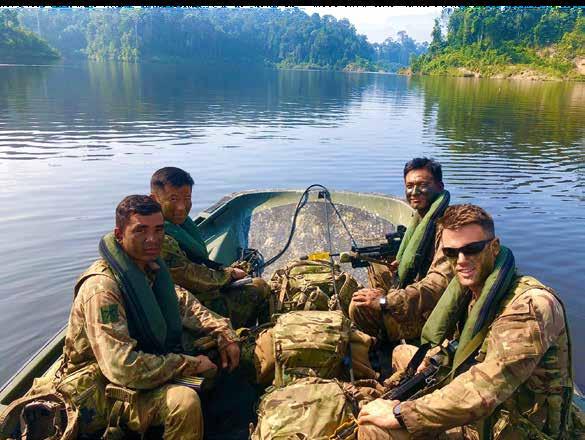
Battlegroup TAC on Ex HIKMAT BERSATU
A Thai Army soldier getting up close with the local wildlife on Ex PANTHER GOLD

battlegroup deployed to Ulu Tutong and this time faced a free-play enemy made up of C (Tamandu Company) and the troop from the KRH. After a road, heli and boat insertion of the battlegroup to Ulu Tutong, Recce Platoon then led a 10-day advance and clear operation in the Brunei jungle. Eventually, after 10 days of signs but no contacts, the Enemy were found, which started a quick planning cycle to redeploy A and B Companies to be ready for the assault with machine guns and mortars in support. Ex HIKMAT BERSATU was the first time 2 RGR had deployed the whole unit into the jungle during our current Brunei tour and C Company provided a varied and unpredictable enemy force. The difficulties of jungle warfare at this scale were replicated throughout, with resupply proving complex and time consuming, and the relatively simple task of finding the enemy taking 10 days to complete. After a final attack in which the enemy were surprised, surrounded, then defeated, the end of the exercise saw 7 Flight conduct their biggest ever aviation lift in Brunei, flying over 200 soldiers out of the jungle in a single day.
Dashain and Tihar
As always, the auspicious festival of Dashain was celebrated in grand style by 2 RGR. With the addition of a professional entertainment troupe from Nepal, there was a great selection of entertainments on show and a good time was had by all. Even with Ex HIKMAT BERSATU stepping on the toes of Dashain, the Pujari party were still able to conduct all the proper ceremonies on time, and the Battalion distilled its celebrations into one week enabling everybody to take a rest.
Ex PANTHER GOLD, November 2019
November saw A (Amboor) Company deploy to Thailand for an exercise with the 23rd Infantry Regiment of the Royal Thai Army. The exercise focussed on building interoperability between the two armies, with both sides learning from the other’s jungle experiences. This saw soldiers from both nations integrating directly into the sections of their partners and following each other’s TTPs throughout in a totally embedded environment. The exercise concentrated on the low-level tactical drills at Platoon level which are of use to the Royal Thai Army in securing their borders against smuggling and poaching. Once again, our soldiers’ excellent ability to work alongside partner nations was in evidence, and the exercise concluded with a fullscale karaoke party to celebrate the joint success.
RGR 25 and Recruit Intake 19
This year 2 RGR celebrated the RGR 25 by combining the parade and celebrations with the arrival and attestation of Recruit Intake 19. After a gruelling nine months at ITC Catterick the RI 19 Riflemen arrived in Brunei to get their first taste of the jungle on a two-week induction cadre. The cadre concluded with a jungle exercise under the close supervision of their instructors. This has truly set the conditions for RI 19’s further training and integration into the rifle companies. Their final attestation parade was a great success and Nishani Mai was expertly borne by Captain Shiva and his party.
Alongside the major events of the year there have been significant successes by individuals and small teams across the Battalion. Corporal Subas Rai (B Company) won the Queen’s Medal at the Army Shooting Competition at Bisley.
Queens Medal winner Corporal Subash Rai being carried in the winner’s chair Following the New Year, JLC 20 for RI 17 is now
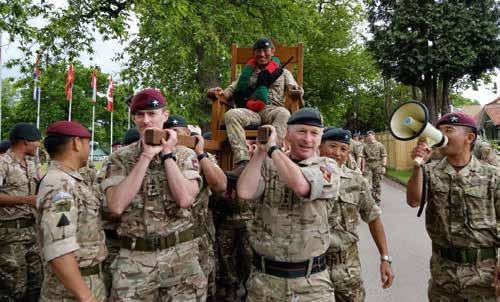
2 RGR Shooting team at Bisley
The shooting team’s success has continued in Canada as part of an international skill at arms meet, with Rifleman Amrit being awarded the best shot of the competition. We have had a team in Nepal conducting AT and there are now many more qualified PADI Open Water divers than last year. We have had a team win the PARAs 10 and most recently the Cambrian Patrol team returned from Wales with gold medals. underway, before B Coy go to New Zealand for the next iteration of Ex PACIFIC KUKRI and finally the unit move to UK.
Anti-Poaching Patrols in Malawi
The last four months has seen members of the 2 RGR
2 RGR’s success on career courses has continued, with many Instructor’s Recommendations and Distinctions on the Section Commanders’ and Platoon Sergeants’ Battle Courses, and 2 RGR Officers and NCOs have continued in that vein on the Jungle Warfare and Operational Tracking Instructor’s Courses. 2 RGR have continued their support to the Jungle Warfare Division in Medecina Lines and have sent two platoons to provide force protection in BATUK. The annual Champion Company Competition was held just before summer leave and, after a hard fought two weeks, Support Company were crowned the winners.
Cpl Ananda on patrol with the Head of Security for Liwonde National Park
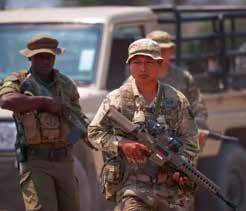

OP CORDED team at the gate of Liwonde Training Centre
deployed on counter illegal wildlife trade operations in Liwonde National Park, Malawi. The team partnered with Malawi’s Department for National Parks and Wildlife (DNPW) and African Parks (AP); two outstanding organisations. This is the fourth iteration of Op CORDED, the name given to the British Army’s counter poaching efforts.
On 1 August 2019, 35 members of 2 RGR along with attachments landed in Malawi’s capital Lilongwe. A road move South and the team were met by sightings of their first wild animals; impala, kudu, waterbuck and elephant all just metres from Liwonde National Park’s (LNP) main gate. The ranger training centre in LNP was to be the home for the team for the next four months. Some final training involving tuning in the team’s tracking skills to the bush, familiarising ourselves with the Ranger’s SOPs, and most importantly revising the dangerous animal behaviour actions on. We were now operational. The team operated on a three-week rotation of long patrols tackling illegal logging in the Forest reserve North of the park, riverine operations combating the poachers entering the park via the Shire river and maintaining a QRF at 15 minutes Notice to Move. Partnered patrols of AP Rangers and Gurkhas achieved fantastic synergy, merging two specialist skillsets to achieve tactical and strategic effect. Whether pursuing poachers before positioning rangers to enact an arrest, or tracking and monitoring black rhino for darting, the tracking prowess of the Gurkha soldiers and AP Rangers was put to the test daily. Operations both during the day and night resulted in large numbers of illegal fishermen being arrested and their boats confiscated in a bid to preserve some of the fish species not found anywhere else in the world. Our operations tested everyone to a man in a new environment, with the added threats of dangerous game, including all the Big 5 species.
From fighting fires day and night to responding to real life emergency casualties, the team deployed in Malawi dealt with an array of life-threatening situations. The list of once in a lifetime experiences is too long to mention, the highlights of which include darting and collaring elephant, rescuing a pangolin (the world’s most illegally trafficked animal) and assisting in the rehabilitation of cheetah. The climax of this operational tour was the critical role the team played in the largest black rhino translocation in history. The team planned and assisted in the moving of 17 male and female black rhinos from South Africa to Malawi before releasing them within LNP.
Upon landing in Lilongwe in the early hours of the morning, the team escorted the seven trucks carrying rhino arriving in LNP just after first light. A quick reconsolidation of manpower and the operation started. Trucks and release teams pushed to all parts of the park ready to release their allotted rhino. The operation was at the forefront of game capture release techniques; rhinos were sedated and guided from their boxes using manpower on heavy duty ropes.
Coming face to face with the vast and majestic black rhino was a surreal and special experience. The rhino would be sedated whilst teams worked quickly to attach ear tags and assist the vets in checking the rhino’s health. Once all the work was done it was a case of injecting the reversal drug and giving the rhino space to wake up and adjust to its new environment. Observed from a quickly-climbed tree or the back of a pick-up, a brief moment of relief as another rhino was successfully released into the park. With the adrenaline still pumping it was then onto the next one, a conveyor belt of rhino wrestling. By the time all the rhinos were released there were a lot of sore bodies, but the stories will be spoken about around fires for many years to come. To see the future of Malawi’s rhino population thriving in the days following the release has to be a highlight of many of the team’s careers. The tangible impact our team had during the tour stretches beyond the realms of the tactical actions on the ground. Community engagement projects culminated in the team raising over £3,000 for the park’s Happy Readers scheme, looking to promote conservation values while teaching young children to read through the medium of interactive story books.
Educating the local population about nature conservation and human wildlife conflict is particularly important; as we experienced when a lady, five months pregnant at the time, was struck and gored in the abdomen by an elephant. Our medical team’s response, led by WO2 Surendra Tamang, to this casualty and their utter dedication to the lady’s well-being resulted in not only saving her life but also the life of her unborn child. Headlines in international press spoke of the ‘miracle’ performed by the medics and shed greater light on the incredible work that our partners were conducting daily. This was not an isolated incident; the medics dealt with and saved, the lives of three individuals during our tour – a testament to the medical skills of each and every one of them.
By the time the team left Malawi lifelong bonds have been forged between soldiers, rangers and the park staff. A shared hardship of four months, culminating in an historic translocation of black rhino had ensured this was the case. A small National Park in a small African country has left an indelible mark on 35 Gurkhas. Liwonde has 35 new lifelong supporters and the world has 35 new conservationists. The African Parks team continue their fantastic work, through hardship and sacrifice, to provide the world with one of its truly special places, protecting some of its most precious species. We are eternally grateful to them.
Jai 2 RGR!










